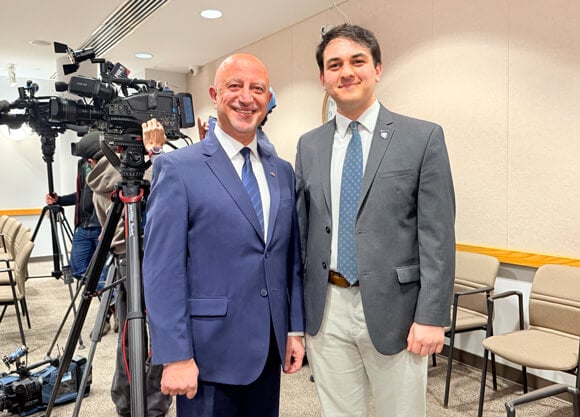
The CT Health Horizons grant will allow Quinnipiac to provide $10,000 per student per year in tuition assistance for qualifying accelerated bachelor of science in nursing (ABSN) students and master of social work (MSW) candidates with the goal of increasing the number and diversity of students in these programs.
“The need for mental health services skyrocketed during the pandemic and an already alarming shortage of nurses is now at an all-time high, leaving our healthcare systems understaffed at a critical time,” said Janelle Chiasera, dean of the School of Health Sciences at Quinnipiac. “We applaud the State of Connecticut for using these federal dollars to make an important investment in the workforce and the health of our communities.”
“We are indeed pleased to offer substantial scholarships through the CT Health Horizon grant and other Quinnipiac initiatives to support the education of social workers, especially those from underrepresented racial and ethnic backgrounds or who are interested in advancing mental healthcare in communities that experience inequities,” said Professor Carol Awasu, chair of the social work department and MSW program director. “Our QU MSW program is uniquely positioned to address the social work and mental health needs in Connecticut. Our clinically focused graduate social work program specializes in health and mental health care and explicitly prepares social work students in anti-racist social work practice, advocacy for equity and social justice.”
Quinnipiac’s School of Nursing was one of only four programs in the state awarded an “Innovative Nursing Program” grant through CT Health Horizons. The School of Nursing has partnered with Hartford HealthCare (HHC) to implement a comprehensive, employer-led Innovative Nursing Program to build a sustainable pipeline into the nursing workforce in Connecticut.
“The grant will also create a quicker pipeline to patient care for Quinnipiac’s existing undergraduate nursing and health science students,” said Provost Debra Liebowitz.
Qualified students may enroll in HHC’s Certified Nurses’ Aide (CNA) Training program or their Patient Care Technician (Associate) curriculum and the program provides a structure for recruiting students eager to work during their college years to work in patient care settings. Importantly, the components of this innovative program together provide multiple pathways for bringing new and upskilled entrants into Connecticut’s nursing and hospital workforce while providing students with unmatched experiential and employment opportunities.
“We are honored to receive this grant and eager to add to our current initiatives to grow and diversify the nursing workforce,” said Lisa O’Connor, dean of the School of Nursing. “This grant allows us to strengthen these efforts and develop innovations with our clinical partners, namely Hartford HealthCare.”
Finally, a faculty hiring grant will expand seat capacity by 1,000 students in nursing and social work programs by supporting faculty levels across Connecticut's educational institutions and clinical sites.
Funded through the federal American Rescue Plan Act, CT Health Horizons is being administered through the Connecticut State Colleges and Universities (CSCU) and involves collaboration with the Office of Workforce Strategy, the Connecticut Conference of Independent Colleges and the Connecticut Hospital Association.
CT Health Horizons is a three-year initiative that works collaboratively across Connecticut's nonprofit institutes of higher education to grow and diversify the nursing and social work student body and workforce. The program is designed to work collaboratively with higher education and healthcare providers to create partnerships that ease career pathways for students to develop and retain talent in-state.
In this Article
Stay in the Loop
Quinnipiac Today is your source for what's happening throughout #BobcatNation. Sign up for our weekly email newsletter to be among the first to know about news, events and members of our Bobcat family who are making a positive difference in our world.
Sign Up Now




























